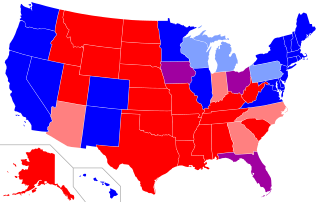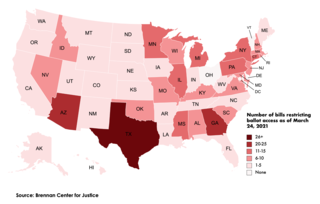Related Research Articles

In computing, a data warehouse, also known as an enterprise data warehouse (EDW), is a system used for reporting and data analysis and is considered a core component of business intelligence. Data warehouses are central repositories of integrated data from one or more disparate sources. They store current and historical data in one single place that are used for creating analytical reports for workers throughout the enterprise. This is beneficial for companies as it enables them to interrogate and draw insights from their data and make decisions.

The Republican Party, also known as the GOP, is one of the two major contemporary political parties in the United States. It emerged as the main political rival of the Democratic Party in the mid-1850s.

2C-I is a psychedelic phenethylamine of the 2C family. It was first synthesized by Alexander Shulgin and described in his 1991 book PiHKAL. The drug has been used recreationally as psychedelic and other reported effects and was sometimes confused with the more potent chemical cousin 25I-NBOMe, nicknamed "Smiles," in the media.
Voter caging involves challenging the registration status of voters and calling into question the legality of allowing them to vote. Usually it involves sending mail directly to registered voters and compiling a list from mail returned undelivered. Undeliverable mail is seen as proof that the person no longer resides at the address on their voter registration. The resultant list is then used by election officials to purge names from the voter registration rolls or to challenge voters' eligibility to vote on the grounds that the voters no longer reside at their registered addresses.

Starting with the 2000 United States presidential election, the terms "red state" and "blue state" have referred to U.S. states whose voters vote predominantly for one party — the Republican Party in red states and the Democratic Party in blue states — in presidential and other statewide elections. By contrast, states where the vote fluctuates between the Democratic and Republican candidates are known as "swing states" or "purple states". Examining patterns within states reveals that the reversal of the two parties' geographic bases has happened at the state level, but it is more complicated locally, with urban-rural divides associated with many of the largest changes.
During the 2004 United States elections, concerns were raised about various aspects of the voting process, including whether voting had been made accessible to all those entitled to vote, whether ineligible voters were registered, whether voters were registered multiple times, and whether the votes cast had been correctly counted. More controversial was the charge that these issues might have affected the reported outcome of the presidential election, in which the incumbent, Republican President George W. Bush, defeated the Democratic challenger, Senator John Kerry. Despite the existing controversies, Kerry conceded the election the following day on November 3.
Sara Taylor Fagen is a technology and data entrepreneur, and former staff member in the administration of President George W. Bush.
Arizona's 1st congressional district is a congressional district located in the U.S. state of Arizona, covering northeastern Maricopa County. Before 2023, geographically, it was the eleventh-largest congressional district in the country and included much of the state outside the Phoenix and Tucson metropolitan areas. From 2013 through 2022, it also included the Navajo Nation, the Hopi reservation, and the Gila River Indian Community, with 25% of the population being Native American. At that time, the district had more Native Americans than any other congressional district in the United States. In the 2022 elections, David Schweikert was elected in the redefined district. It was one of 18 districts that would have voted for Joe Biden in the 2020 presidential election had they existed in their current configuration while being won or held by a Republican in 2022.

Kris William Kobach is an American lawyer and politician who is the Attorney General of Kansas. He previously served as the 31st Secretary of State of Kansas. A former Chairman of the Kansas Republican Party, Kobach came to national prominence over his support for immigration controls, including involvement in the implementation of high-profile anti-illegal immigration ordinances in various American cities. Kobach is also known for his calls for stronger voter ID laws in the United States, reinstating the National Security Entry-Exit Registration System, and his advocacy for anti-abortion legislation. He has made claims about the extent of voter fraud in the United States that studies and fact-checkers have concluded are false or unsubstantiated.
DataMart and Demzilla were databases that were rolled out by the United States Democratic Party from 2002. By 2004, Datamart contained information on 166 million registered voters, and with input from public voter information and consumer data from data mining companies a single entry might have 200 to 400 items of information. Demzilla was a smaller database used for fundraising and organization volunteers, it includes the names and information persons or groups the DNC does business with, and those who are donors to the Democratic party, it also includes volunteers, activists, local and state party leaders, and members of the press.
Microtargeting is the use of online data to tailor advertising messages to individuals, based on the identification of recipients’ personal vulnerabilities. Such tactics can be used for promoting a product or a political candidate. Direct marketing datamining techniques that are used often involve predictive market segmentation. Microtargeting's tactics rely on transmitting a tailored message to a subgroup on the basis of unique information about that subgroup.

The Lunar Sample Laboratory Facility (LSLF) is a repository and laboratory facility at NASA's Lyndon B. Johnson Space Center in Houston, Texas, opened in 1979 to house geologic samples returned from the Moon by the Apollo program missions to the lunar surface between 1969 and 1972. The facility preserves most of the 382 kilograms (842 lb) of lunar material returned over the course of Apollo program and other extraterrestrial samples, along with associated data records. It also contains laboratories for processing and studying the samples without contamination.
Voter suppression in the United States consists of various legal and illegal efforts to prevent eligible citizens from exercising their right to vote. Such voter suppression efforts vary by state, local government, precinct, and election. Voter suppression has historically been used for racial, economic, gender, age and disability discrimination. After the American Civil War, all African-American men were granted voting rights, but poll taxes or language tests were used to limit and suppress the ability to register or cast a ballot. The Civil Rights Act of 1964 improved voting access significantly.
Matthew McDade Phelan is an American real estate developer and Republican member of the Texas House of Representatives for District 21, which includes most of Jefferson and all of Orange and Jasper counties in the southeast corner of the state. He has been Speaker of the Texas House of Representatives since January 2021.
Michael B. Simon is an American entrepreneur and analytics expert who notably led analytics efforts on Barack Obama's 2008 presidential election campaign. He is the co-founder of the technology startup Elucd.

Interstate Voter Registration Crosscheck was a database in the United States which aggregated voter registration records from multiple states to identify voters who may have registered or voted in two or more states. Crosscheck was developed in 2005 by Kansas Secretary of State Ron Thornburgh in conjunction with Iowa, Missouri, and Nebraska. In December 2019, the program was suspended indefinitely as part of a settlement of a lawsuit filed by the American Civil Liberties Union of Kansas challenging Kansas' management of the program. Prior to Crosscheck's legally mandated suspension, a dozen states had withdrawn from the program citing the inaccurate data and risk of violating voters' privacy rights. Crosscheck was also accused of facilitating unlawful purges of voters in a racially discriminatory manner.

Katherine Marie Walsh is an American Republican political operative who served as White House Deputy Chief of Staff for Implementation in the Donald Trump administration. She also worked with the Trump-aligned 501(c)(4) advocacy organization America First Policies.

The 2020 United States presidential election in Hawaii was held on Tuesday, November 3, 2020, as part of the 2020 United States presidential election in which all 50 states plus the District of Columbia participated. Hawaii voters chose electors to represent them in the Electoral College via a popular vote, pitting the Republican Party's nominee, incumbent President Donald Trump, and running mate Vice President Mike Pence against Democratic Party nominee, former Vice President Joe Biden, and his running mate California Senator Kamala Harris. Hawaii has four electoral votes in the Electoral College.

The 2020 United States presidential election in Nevada was held on Tuesday, November 3, 2020, as part of the 2020 United States presidential election in which all 50 states plus the District of Columbia participated. Nevada voters chose electors to represent them in the Electoral College via a popular vote, pitting the Republican Party's nominee, incumbent President Donald Trump, and running mate Vice President Mike Pence against Democratic Party nominee, former Vice President Joe Biden, and his running mate California Senator Kamala Harris. Nevada has six votes in the Electoral College.

Following the 2020 United States presidential election and the unsuccessful attempts by Donald Trump and various other Republican officials to overturn it, Republican lawmakers initiated a sweeping effort to make voting laws more restrictive within several states across the country. According to the Brennan Center for Justice, as of October 4, 2021, more than 425 bills that would restrict voting access have been introduced in 49 states—with 33 of these bills enacted across 19 states so far. The bills are largely centered around limiting mail-in voting, strengthening voter ID laws, shortening early voting, eliminating automatic and same-day voter registration, curbing the use of ballot drop boxes, and allowing for increased purging of voter rolls. Republicans in at least eight states have also introduced bills that would give lawmakers greater power over election administration after they were unsuccessful in their attempts to overturn election results in swing states won by Democratic candidate Joe Biden in the 2020 election. The efforts garnered press attention and public outrage from Democrats, and by 2023 Republicans had adopted a more "under the radar" approach to achieve their goals.
References
- ↑ "GOP Data Center (formerly Voter Vault)". Filpac.com. Retrieved 2020-07-02.